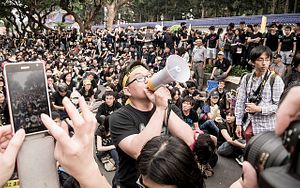The landslide wins by the Taiwanese opposition in local elections has not only made clear the public’s preference but foretells an uncertain future for Taiwan.
In 1997, the ruling Chinese Nationalist Party (Kuomintang, KMT) also lost control of several major counties and cities, including Taoyuan, Taichung and Changhwa, to the opposition Democratic Progressive Party (DPP) in local government elections. Three years later, the KMT was defeated by the DPP in the presidential election. And now again the DPP and other non-KMT candidates have enjoyed a thumping victory in local polls. But this time the context is very different.
Since 2008, the administration of President Ma Ying-jeou has pursued a strategy of working with China to share the benefits of the mainland’s rising economy, at the cost of accepting ever greater Chinese influence. The approach has not been popular, with critics claiming that the economic gains have not been sufficient to justify the concessions made. Ma will find it difficult counter this unhappiness before 2016, because the economic benefits for Taiwan of cooperating with China tend to be concentrated in areas such as its industrial structure, which will take a long time to transform.
Similar to Obama’s stepped up activity after the Democratic Party’s drubbing in the recent mid-term elections, Ma may actually accelerate cross-strait negotiations in a bid to conclude new agreements with China, especially political deals. In other words, Beijing may end up looming even larger over Taiwan after these elections.
Since its failed threat to use force – delivered in the form of military exercises during the Taiwanese presidential elections in 1996 – China has developed a range of tools through which it can wield influence in Taiwan. The 2005 visit to China of then KMT Chairman Lien Chan offered Beijing entre into Taiwanese affairs. Since then, the KMT’s promotion of cross-strait integration has generally been in China’s favor, particularly after the KMT returned to power in 2008. Following the party’s failure in this election, Beijing may decide it is time to intervene directly, using three types of leverage: commerce, demography and security. In doing so, it could seek to confine or manipulate the political situation in Taiwan, including elections, to prevent the Taiwan from exiting the current cooperative orbit.
On the commercial front, investment, production chains, and finance all offer China means through which it can influence policy. First, many Taiwanese companies have investments in China, which are vulnerable to Chinese administrative measures, such as taxes, labor welfare, and environmental protection laws. Beijing could also target the more than one million Taiwanese living in Mainland China. As long as those voters can return to vote, they can in turn affect election outcomes.
Second, given rapid economic integration, a cross-strait production chain has been formed and Beijing can exert economic pressure on Taiwan’s economy by slowing down, postponing, or even banning trade across the strait. About 40 percent of Taiwan’s exports go to China, so that action could shock Taiwan’s economy, again influencing voters.
Third, since the Ma administration has generally opened Taiwan’s market to Chinese capital, a rapid withdrawal of Chinese capital could deliver a severe blow to Taiwan’s economy, for instance in the real estate market. Moreover, attracted by higher interest rates, a great deal of Taiwanese money is invested in China’s financial markets, giving China the ability to exploit investors through asset freezes or other means.
Certainly, any economic action Beijing took against Taipei would harm China too, but thanks to strict government control and its authoritarian system, China is better equipped to withstand the fallout. And in disputes with Japan and the Philippines, China has already shown it is quite willing to use economic weapons.
The Ma administration has also made it easier for Chinese people to visit and reside in Taiwan, with a quicker path to citizenship. As a consequence, there may be 400,000 or more new voters with Mainland Chinese origins, enough to be critical in a close election. Moreover, the large number of Chinese visitors in Taiwan at any one time could theoretically provide cover for covert activity, such as fomenting unrest, at a time when Taiwan’s own military is shrinking.
Finally, the PLA and other Chinese armed forces are now more than a match for their Taiwanese counterparts. Budget limitations have meant that Taiwan simply has not been able to match China’s military buildup. As a consequence, Beijing enjoys a widening gap in both quantity and quality over Taipei in all major weapon systems. Asymmetrical warfare could be a solution for Taiwan, but the Ma administration has slashed the budgets for several critical projects, such as mid-range cruise missiles. In addition, with poor internal management, espionage is on the rise, further weakening Taiwan’s defense. Although the U.S. military presence in the Taiwan Strait has been a key factor since 1950, China’s anti-access/area denial (A2AD) strategy and capabilities could effectively constrain operations by the U.S. At any rate, Washington may decide it is unwilling to risk a major conflict with China.
In short, an election victory by Taiwanese opposition parties may no longer be able to free Taiwan from the influence of the mainland. Indeed, both opposition leaders and ordinary voters may well find themselves facing serious challenges in the near future.
Shang-su Wu is a research fellow in the Military Studies Programme, a constitute unit of the S. Rajaratnam School of International Studies (RSIS), Nanyang Technological University, Singapore.

































